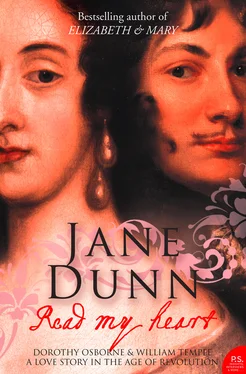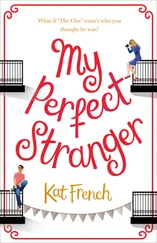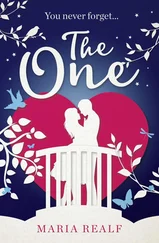Perhaps in answer to this William wrote a letter to her, which he embedded in the translated and reworked French romances he sent to her during their separation. They were a way of expressing his frustrated feelings for her, he told Dorothy, and a cartharsis too, for contemplating the miseries of others put his own suffering into perspective:
I remember you have asked me what I did[,] how past my time when I was last abroad. such scribling as this will give you account of a great deal ont. I lett no sad unfortunate storys scape mee but I would tell um over at large and in as feeling a manner as I could, in hopes that the compassion of others misfortunes might diminish the ressentment of my owne. besides twas a vent for my passion, all I made others say was what I should have said myself to you upon the like occasion. you will in this find a letter that was meant for you. 31
He entitled the collection of stories, A True Romance, or the Disastrous Chances of Love and Fortune , with more than an eye to his own much impeded love affair with Dorothy. William then added a dedicatory letter, quite obviously written to Dorothy about their own emotional plight. His conversational writing style, so valued in his later essays, was already evident. Although this letter was formal, as there was a chance that the collection of romances would be read by others, it was remarkably simple and straightforward for someone with the emotional exuberance of youth, writing at a time when grandiose prose style was still admired. This was a rare letter in his youthful voice to his young love and worth quoting extensively as it transmitted something of his character and energy, setting his epistolary presence beside hers. He started by offering her his heart and his efforts at creative story-telling, diminished, he believed, by his all-consuming love for her:
To My Lady
Madame
Having so good a title to my heart you may justly lay claime to all that comes from it, theese fruits I know will not bee worth your owning for alas what can bee expected from so barren a soile as that must needs bee having been scorched up with those flames wch your eys have long since kindled in it.
He added that the story of the viccissitudes of their love was more than a match for the ‘tragicall storys’ that follow. But it would take too long, was too painful to recall and it had no end, ‘should I heer trace over all the wandring steps of an unfortunate passion wch has so long and so variously tormented me … Tis not heer my intention to publish a secrett or entertain you with what you are already so well acquainted [i.e. their own love story] tis onely to tell you the occasion that brought thees storys into the frame wherein now you see them.’ William then admits his painful longing for her presence and inability to endure this long separation:
‘Would I could doe it without calling to mind the pains of that taedious absence, wch I thought never would have ended but with my life, having lasted so much longer then I could ever figure to myself a possibility of living without you. How slowly the lame minutes of that time past away you will easily imagine, and how I was faine by all diversions to lessen the occasions of thinking on you, wch yett cost mee so many sighs as I wonder how they left mee breath enough to serve till my return.’
He continued with an explanation of how the translating and reforming of these tales took his mind off his own misfortunes and gave a voice to his overflowing feelings:
‘I made it the pastime of those lonely houres that my broken sleeps usd each night to leave upon my hands. besides in the expressing of their severall passions I found a vent for my owne, wch if kept in had sure burst mee before now, and shewd you a heart wch you have so wholly taken up that contentment could nere find a room in it since you first came there. I send you thees storys as indeed they are properly yours whose remembrance indited [inspired] whatever is passionate in any line of them.’
William then signed off, dedicating his life to her:
And now Madam I must onely aske for pardon for entitling you to The disastrous chances of Love and Fortune ; you will not bee displeasd since I thereby entitle you to my whole life wch hath hitherto been composed of nothing else. but whilst I am yours I can never bee unhappy, and shall alwaies esteem fortune my friend so long as you shall esteem mee Your servant 32
In fact this second journey abroad, of which Dorothy had been so keen to hear more, was not spent merely moping for his love and writing melodramatic romances. He also found himself highly impressed by what he found in the Dutch United Provinces, a republic in its heyday, full of prosperous, liberal-minded people who nevertheless lived frugally and with a strong sense of civic duty and pride. This golden age was immortalised by the extraordinary efflorescence of great Dutch painters, among them Vermeer, Rembrandt and van Hoogstraten, whose paintings of secular interiors, serene portraits and domestic scenes of vivid humanity reflected the order and self-confidence of an ascendant nation. William was particularly impressed by how willingly the Dutch paid their taxes and took the kind of pride in their public spaces, transport and buildings that Englishmen took only in their private estates. Brussels also attracted him greatly; still at the centre of the Spanish Netherlands, it was here that he learned Spanish. He suggested to his sister, and probably to Dorothy too, that he was considering a career as a diplomat and should Charles II return to the throne and offer him employment, ‘whenever the Governement was setled agin, he should be soe well pleas’d to serve him in, as being His Resident there [in Brussels]’. 33
William’s expansive reply to Dorothy’s letter requesting details of what he had been up to during his prolonged absence abroad, prompted her to divulge just how many rivals for her hand she had had to fend off in his absence. First there was an unidentified suitor ‘that I had little hope of ever shakeing of[f]’ until she persuaded her brother to go and inspect his estate. To Dorothy’s delight the house was found to be in such dire condition that she was able to grasp this as reason enough to decline his offer of marriage. Not long after, she heard that this suitor had been involved in a duel and was either killed or had been the one who had done the killing and therefore had fled. * ‘[Either way] made me glad I had scaped him, and sorry for his misfortune, which in Earnest was the least retourne, his many Civility’s to mee could deserve.’
Her mother’s death, she continued, gave her a brief respite for mourning but then a bossy aunt, most probably Lady Gargrave, asserted her authority and pressed another possible husband on her. Luckily her dowry was considered too meagre for him (he wanted an extra £1,000 from her father: this enraged Dorothy who thought him so detestable that even if her dowry was £1,000 less she considered that too much). Then she introduced to William the suitor she nicknamed ‘the Emperour’ who was to be the subject of a running joke between them: ‘some freinds that had observed a Gravity in my face, which might become an Elderly man’s wife (as they term’d it) and a Mother in Law [step-mother] proposed a Widdower to mee, that had fower daughters, all old enough to be my sister’s.’ To William she pretended that the reputation of this man for intelligence and breeding, as well as his owning a great estate, made her think he might do. ‘But shall I tell you what I thought when I knew him, (you will say nothing on’t) ’twas the vainest, Impertinent, self conceated, Learned, Coxcombe, that ever I saw.’ 34
This ‘impertinent coxcomb’ was Sir Justinian Isham, a royalist from Northamptonshire who had lent money to Charles I and been imprisoned briefly during the civil wars for his pains. He was forty-two when he sought her hand in marriage and, as Dorothy admitted, a learned gentleman and fellow of Christ’s College, Cambridge, who built an excellent library at his country seat, Lamport Hall. His scholarship, however, impeded his letter-writing style, she believed, and in her explanation she sent a mischievous backhanded compliment to William:
Читать дальше












